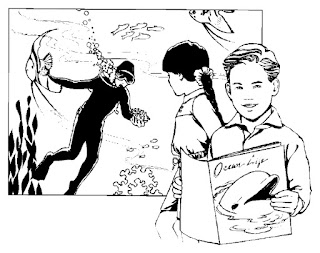Dr. Gerald Wheeler is the interim executive director of the National Science Teachers Association (www.nsta.org), the world’s largest professional organization representing science educators of all grade levels. A fuller version of this interview (conducted by Pam) is at http://www.keenreaders.org/dr-gerald-wheeler-on-youth-and-science
Q: How would you sum up the state of science knowledge among youth in North America today?
 A: We’re definitely not in line with satisfying what we need for a workforce in the next ten to fifteen years.
A: We’re definitely not in line with satisfying what we need for a workforce in the next ten to fifteen years.Q: Your thoughts on how to improve that?
A: Parents don’t need to have a strong background in science to help their children learn and appreciate science. Doing science with your child can be as simple as helping him or her measure the ingredients for a batch of chocolate chip cookies. Don’t let science become a weak part of your child’s education. Get involved.
Q: Do problems with reading and writing affect science learning?
A: It turns out that science is actually a gift in this case. Science and technology can get struggling readers engaged, and actually improve their math and literacy scores. It’s a door opening to get them engaged in their schooling. If they really like the hands-on, real-world problems, as soon as they do these, they get immersed in mathematics and reading.
Q: Is online learning suited or unsuited to science education?
A: It works pretty well, but is a challenge because a lot of science is hands-on.
Q: What can parents do to help kindle or grow their children’s interest in science?
A: I think it starts long before high school. It’s about engaging them by answering questions and exploring things. Dinnertime is a great opportunity for your family to have discussions about science-based news stories (space shuttle missions, severe weather storms, etc.). Movies and TV shows that feature science-related themes are also good topics for discussions.
Too many parents say, “Well, that’s the job of the schools, and don’t give our kids homework because it interrupts our quality time.” Also, too many families come home and eat at different times or head off to their separate computers or televisions. They need to get engaged in what’s happening in the schools, and find ways to be supportive of the teachers and the school program. For example, parents can participate in their child’s school science program by locating scientists and others to be guest speakers, or can accompany their child on a field trip to a science-related place.
It’s a struggle with the disenchanted child; he is really destroying his future if he doesn’t get engaged. We have to make sure we get them engaged.
Excerpted from Jump-Starting Boys: Help Your Reluctant Learner Find Success in School and Life, by Pam Withers and Cynthia Gill (Viva Editions). All references (footnotes) contained in the book.


